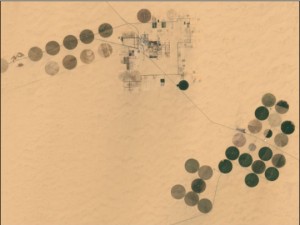センターピボット方式の灌漑設備を普及させた人物がなくなったことそうだ。
センターピボット式というのはアメリカでよく見られる灌漑方式で、その名のとおり巨大なスプリンクラーが回転することで散水を行う。その仕組み故に円形の耕作地が大量に形成されるのが特徴的だ。追悼記事がThe New York Timesに掲載されている。
The breakthrough for Mr. Daugherty came in 1953, when he bought the rights to manufacture a new irrigation system, the brainchild of a Nebraska farmer, Frank Zybach.
Daugherty氏は1953年にセンターピボット方式の灌漑設備を製造する権利を得て営業を始めた。彼の会社、Valmont Industriesは現在も同方式の灌漑設備のシェアにして半分以上を占めている。センターピボット方式は次のような点で優れている。
- 水を効率的に利用出来る
- 人手がかからない
- 平らでない土地でも利用可能
こういった長所ゆえに以前は経済的に利用できなかった土地でも農業を行うことが可能になり大きく普及した。
In this sense, capitalism helps us to adapt to climate change because it helps us to have the $ to finance basic research and great centers of research and discovery.
この事例では発明者自身ではない他人が権利を購入しビジネスとして成功させており、知的財産制度を含めた市場の重要性がよくわかる。次の写真はサハラ砂漠での様子だ。
ただその一方でセンターピボット方式に問題がないわけではない。
Ogallala Aquifer – depth, important, system, source
The Ogallala Aquifer is being both depleted and polluted. Irrigation withdraws much groundwater, yet little of it is replaced by recharge.
センターピボット方式が最も利用されているとされるアメリカ中部のオガララ帯水層を含む地域では地下水位の低下や汚染が深刻だ。センターピボット方式は水資源を有効活用するという点で同じ規模の農業をする上では地下水への影響が少ないわけだが、大規模な農業を可能にするため結果的には地下水へ深刻な影響を与える。環境への影響を適正化するためには単に効率化するだけではなく、水資源に適切な価格をつけるなど規制が必要なわけだ。

